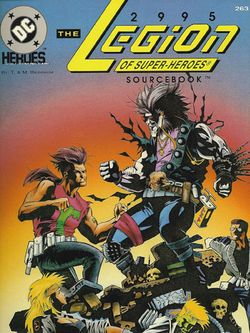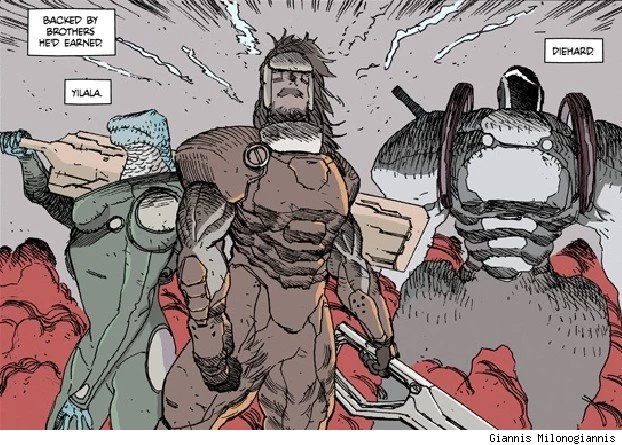Most superheroes (and superhero rpgs) are set in the modern day. There's no reason superheroes have to be limited to that era, of course. At least as early as 1955, we got a glimpse of Brane Taylor, the Batman of the year 3000. Just a few years later, the preeminent group of future heroes made their debut: The Legion of Super-Heroes. These guys were big enough to get supplements of both editions of the Mayfair DC Heroes rpg: Legion of Super-Heroes vol. I and II and 2995: The Legion of Super-Heroes Sourcebook.
Marvel's answer to the Legion was the Guardians of the Galaxy. These guys were not the super-group of b-list characters about to get a movie; this was a group of freedom fighters against Badoon tyranny in the 31st century. They were (originally) mostly from the Sol System, leaving one to wonder how they were going to guard the whole galaxy. They got a series in the 90s, but then their name was given to another group. No rpg supplement for any Marvel game.
There are a number of future heroes in dystopian futures--enough that I think they are really a separate subgenre. Most of these are at Marvel and the lion's share are alternate timelines from the X-Men. Marvel did have a whole 2099 line that was slightly less dystopian than most X-Men futures.
A more science fictionish approach to the future supers is Image's Prophet. The story isn't particularly superheroic so far so maybe a superhero rpg wouldn't be the best system for it, but it is completely tied to the modern day Extreme comics universe and does feature future versions of Prophet, Diehard, Troll, and Bedrock.
Anyway, there's a lot of inspiration to be had in the above works, I think.












8 comments:
I was a big fan of the original Guardians run.
I think E-Man was a bit futurey too, but maybe I am wrong. All I remember now is the Evil Brain from Sirius.
Prophet is still on my to-read list. Looking forward to it.
As for LSH, I first encountered them just following the Great Darkness saga. Been a fan ever since, through every incarnation.
Glad to see them get some love now and then.
I used to read the cheesy old Legion stories as a kid. The basic premise is fun; supers in the future. The execution has been pretty hit or miss. A lot of the tropes have been subverted; what used to be super-heroic is pretty much off-the-shelf tech now, or soon will be. I think Booster Gold dealt with that to some extent.
Outside of dystopian milieus the super hero thing kind of fails, possibly because a super hero is almost always supposed to be an exception and not the norm...and in a future where there is wide-spread access to technology it gets tougher to make a super hero unique or even relevant. At the end of God Emperor of Dune everyone descended from Siona gets lifted out of the prevailing matrix of options and consequences--that whole business is rife with super hero possibilities, as is what was done to the Bashar Teg. There's a future super hero, descended from a future super hero (Paul Atreides).
Building a campaign around a future founded on super heroes might be fun.
@John - Hmmm...I don't know. I've read scant few issues of E-Man.
@Jon - Prophet is good stuff. I think you will enjoy it.
@Jim - Very good points. Super-powers become less "special" in the future. I'm not sure they're completely superfluous, though. A fair number of fiction and anime, from Star Wars to things less obscure, portray characters with super abilities in a futuristic environment--and Superman's always going to be godlike in power, whatever the time period.
The original Guardians of the Galaxy did get written up in the Ares section of Dragon Magazine #100 for the original Marvel RPG.
@Tom - Thanks! I forgot about that.
RE: Superman, you make a good point--I liked the old 'Man of Tomorrow' stories. The whole idea of Superman being some sort of hyper-evolved entity, an example of what people could develop into, was pretty cool.
Stapledon has a few things to offer in this regard as well with his First Men, Last Men stuff.
You're right, super powers might not become superfluous, but a lot of the familiar assumptions do get out-moded fast, leaving us with a lot of new territory to go explore. What sort of adventures do immortals have? What is considered dangerous when you can be replicated repeatedly and death is not that big an obstacle any more? What makes a person heroic in a world where a simple text book is smarter than entire civilizations? There's a lot of fresh stuff to go mine out of the imaginative-aether in this direction...
@Jim - Very true. It defnitely calls for more thought to do the two right than has been traditionally put into it.
Post a Comment